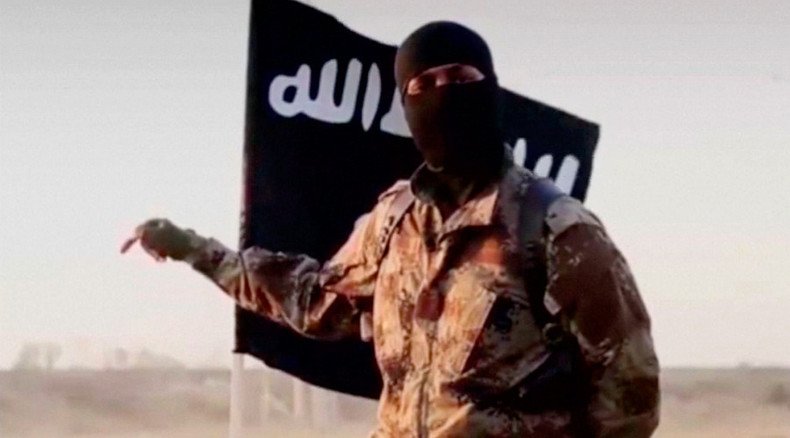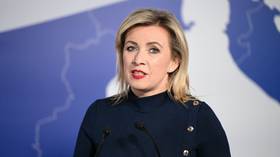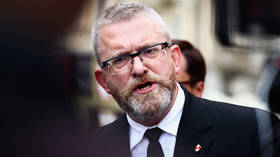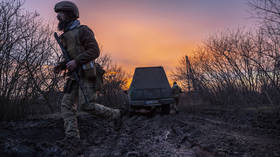‘Radicalizing radicals’: US military aid landing in hands of ISIS

Foreign powers are meddling within Syrian political affairs not to defeat ISIS as they claim, but to get rid of a regime they don’t approve of to replace it by God knows what, Catherine Shakdam from the Beirut Centre for Middle East Studies told RT.
RT: The rebels and government forces are fighting not only each other but Islamic State [IS, formerly ISIS/ISIL] at the same time. How is this multiple-front conflict affecting attempts to prevent terrorism?
Catherine Shakdam: That’s the main problem. It’s not just that they are fighting each other. I think that there are very different goals as to what foreign powers are trying to achieve in Syria. And for now when it comes to the US for example all Washington seems to want to do is to neutralize and get rid of President Bashar Assad in Syria rather than really fight IS. That’s the main problem. We have foreign powers meddling within Syrian political affairs not to defeat IS as they claim, but rather to get rid of a regime that they do not approve of to replace it by God knows what, because they created a situation and a power vacuum which would essentially allow for Islamist radicals to take over Damascus and I don’t think that anyone would want that.
READ MORE: Ousting Assad militarily would enable ISIS to seize Syria – Lavrov
RT: Iran and Turkey brokered a 48 hour ceasefire between the Insurgents, Assad's army and Hezbollah. How significant is their diplomatic intervention? Could this move be helpful in resolving the crisis long-term?
CS: There is a real effort here to try to breach differences and to look towards. I’m hoping, diplomacy will actually pave the way for a resolution rather than resort to military intervention. That’s the message that is coming out of Iran and Russia as well. They are all trying to calm the situation, defuse it and try to find a way which would be acceptable for everyone. I think that if indeed the fight of IS takes precedence over everything else then there is no reason why a diplomatic solution could not take place.
The problem is until now Washington’s intent on getting rid of the Syrian president, even though it’s not really the business to decide whether the Syrian people should have him as a president or not. It’s really up to the Syrians to decide for themselves. That’s the main problem – we see foreign powers trying to decide what people should do or shouldn’t do in this case.
RT: The US and its allies are stepping up their support for so-called moderate rebel groups. How could that change what's happening in your country?
CS: Whenever I hear the US or even Britain talking about supporting moderate Islamists in Syria or anywhere else I tend to cringe. Who are really those moderates? We know those moderates are not so moderate after all. Most of the military aid which actually landed in Syria or even in Iraq landed in the hands of the likes of IS and that’s a worry, because what we are seeing is radicalization of the radicals. And whenever you are attempted to fuel by adding more military power to the situation which is already unacceptable and very volatile you are making the problem worse here. And they are not trying to go after the ideology, what they are trying to is militarize the ideology of terror which is of course very dangerous and it’s leading people to wonder who it is that they are serving and who it is they are really trying to support and help because the assistance is going to ISIS as far as I can see.
ISIS an ‘invaluable tool for achieving US goals in the region’
Political writer and journalist Dan Glazebrook suggests that the US is playing a double game in the Middle East, preferring to contain Islamic State to a certain extent, rather than destroy the jihadist group outright – as it’s too valuable an asset, undermining Washington’s global rivals.
RT: Despite all the efforts by the US to train the Iraqi army and vet the Syrian opposition, Islamic State [formerly ISIS/ISIL] is still on the offensive. Why do you think this is having little impact on the jihadist group?
Dan Glazebrook: The US is still not fully committed, frankly, to the battle against Islamic State. I think it’s actually more of a phony war if you look at it. They are not giving the kind of support that’s been requested by the so-called allies in the Iraqi army; even the Iraqi special forces, which is supposed to have a kind of special relationship with the US, were not given the support they needed and some of the recent kind of conquests of some major cities in Iraq. The main groups fighting Islamic State – in particular, the Syrian government – the US is still committed to overthrowing them. All analysts pretty much agree, as my understanding is that if Assad were to be overthrown, then the major winners would be Islamic State, which is the major leading force in the so-called Syrian revolution, if it can still be called that. I think Islamic State is still seen by some in the US as frankly too much of a valuable asset to achieving US goals in the region, that is destabilizing Syria and also destabilizing Iraq. Islamic State is being used as kind of leverage against the Iraqi government so that the US can step in as its protector and then again as kind of leverage in trying to call the shots with the Iraqi government.
READ MORE: US planes begin bombing ISIS in Syria from bases in Turkey
RT: Russia has suggested its own plan to battle Islamic State, which would involve coalition forces on the ground, including Assad's army, as well as an air campaign. Do you think the plan is in everyone's best interests?
DG: It’s kind of obvious, isn’t it? It’s obvious if people are serious about taking on Islamic State then they should unite with the other major forces who are leading that fight. Number one among them is the Syrian government. That’s really kind of calling the West’s bluff, because it proves that the West is still not fully committed to this, they are not prepared to actually do all that’s necessary to take on this group. And we’ve seen it recently with the announcement by Islamic State that they want to move on to the Caucasus region and more into Central and even East Asia, Indonesia and so on. It’s interesting, isn’t it? It tells you something I think about Islamic State and its relationship with the West that Obama announces a pivot to Asia and then a few months later you have Islamic State making its own pivot to Asia. The fact of the matter is that Islamic State still continues to be focusing its main attacks on those regional and global powers that the West would also like to see weakened and defeated – Syria, Iran and ultimately also Russia and China. That’s why they are playing this kind of double game; they want to contain Islamic State to a certain extent, clip its wings here and there, but it’s too much of a valuable asset undermining their global rivals to actually let them go.
The statements, views and opinions expressed in this column are solely those of the author and do not necessarily represent those of RT.
The statements, views and opinions expressed in this column are solely those of the author and do not necessarily represent those of RT.












